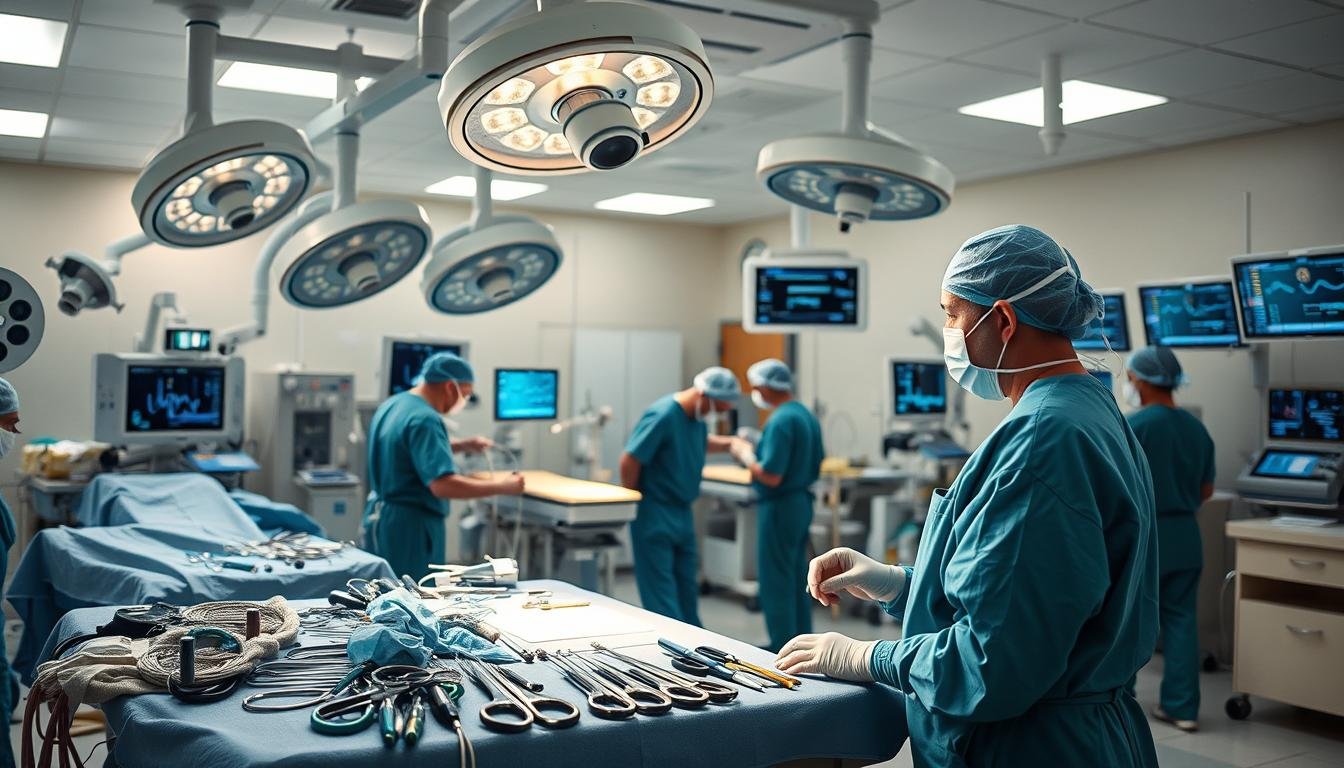Surgical techs are vital in the operating room. They ensure smooth and efficient surgical procedures.
Their tasks include preparing the operating room and sterilizing instruments. They also assist surgeons during complex operations.
A focused surgical operating room scene featuring a surgical technologist in scrubs and gloves preparing surgical instruments on a sterile table, bright overhead lights illuminating the space, meticulously organized tools, high-tech medical equipment in the background, a sense of urgency and professionalism in the atmosphere.
Surgical techs work with surgeons, nurses, and other medical professionals. They help deliver the highest quality patient care.
Their main job is to create a sterile surgical environment. They make sure all instruments and supplies are ready.
This careful preparation is key for successful surgeries. It reduces risks and improves patient outcomes.
During operations, surgical techs assist surgeons directly. They pass instruments, hold retractors, and suction the surgical site.
Skilled techs can anticipate the surgeon’s needs. This allows surgeons to focus on complex tasks.
Understanding the Role of a Surgical Tech
Surgical techs help surgeons during operations. They make sure the room is clean and has the right tools.
These pros work with doctors and nurses. They get the room ready and give tools to the surgeon.
Surgical techs pay close attention to details. They know the rules to keep everyone safe.
They also help take care of patients. Surgical techs watch how patients are doing during surgery.
They make sure patients are comfy and safe. Their work is very important in hospitals.
Key Responsibilities of Surgical Techs
Surgical techs are vital in the operating room. They ensure smooth and efficient surgical procedures.
Their tasks cover preoperative, intraoperative, and postoperative duties. These tasks are key for patient safety and good surgical outcomes.
The main duty is to prepare the operating room. This involves setting up equipment, instruments, and supplies.
Surgical techs must keep the environment sterile. They work with the surgical team to meet their needs.
During surgery, techs help the surgeon and team. They pass instruments, hold retractors, and watch the sterile field.
Surgical techs need a keen eye for detail. They must predict the surgeon’s needs for smooth operations.
After surgery, techs clean up and prep for the next procedure. They dispose of used materials and restock supplies.
Techs also clean and sterilize the operating room. This ensures it’s ready for the next patient.
Educational Requirements for Surgical Techs
Surgical technologists need special education and certification. They must finish an accredited program at a college or school. These programs teach important skills for the job.
Most programs lead to an associate’s degree. Students learn in fake operating rooms. They practice helping surgeons and keeping things clean.
After graduating, students must pass the Certified Surgical Technologist (CST) exam. This exam is required in most states. It shows they have the right skills.
Surgical techs must keep learning to keep their certification. This helps them stay current with new medical advances. With proper education, they can start an exciting healthcare career.
Skills Essential for Success as a Surgical Tech
Surgical techs need special skills to do well in the operating room. They must have the technical know-how and people skills to succeed.
Surgical techs must know medical terms and how to keep things clean. They need to use tools correctly and pay close attention to details.
Operating room communication is key for surgical techs. They must work well with surgeons, nurses, and other health workers.
Good surgical techs can solve problems quickly. They stay calm when things get tough in the operating room.
Surgical techs must be ready to learn new things. The operating room is always changing with new tools and methods.

Work Environment and Schedule of a Surgical Tech
Surgical techs work in hospital operating rooms. They support surgical procedures in fast-paced, demanding environments.
Surgical techs may also work in outpatient centers and specialty clinics. Their job requires meticulous attention to detail in all settings.
A busy surgical operating room with a sterile environment, bright overhead lights, and an array of surgical instruments neatly arranged on a table, a surgical tech in scrubs preparing for a procedure, monitors displaying vital signs in the background, and a team of medical professionals focused on their tasks, all depicted in a realistic style.
Many surgical techs work full-time hours. Their schedules often include on-call or extended shifts.
Surgical techs may work day, evening, or overnight hours. Weekends and holidays are sometimes part of their work schedule.
This job needs adaptable and resilient professionals. Surgical techs must work well in team-based settings.
Career Advancement Opportunities for Surgical Techs
Surgical techs have many chances to grow in their careers. They can specialize and take on new roles in healthcare.
One way to advance is through specialization. Techs can focus on specific types of surgery.
They can train in areas like heart, bone, or emergency surgery. This makes them very valuable team members.
Some techs move into leadership roles. They may oversee other techs and manage surgical schedules.
Others choose to further their education. They might become nurses or physician assistants.
The surgical tech field offers many paths for growth. Professionals can keep learning and improving their skills.
Challenges Faced by Surgical Techs
Surgical techs have a rewarding but tough job. They face unique challenges that need strength and dedication to patient care.
The operating room is very stressful. Techs must stay calm during complex procedures with time pressure.
The job is physically demanding, too. Techs stand for hours and lift heavy equipment.
This can cause tiredness and injuries. Good practices can help prevent these problems.
Techs work with many other medical staff. They must communicate well in high-stress situations.
Dealing with different personalities can be tricky. The medical field’s structure adds to this challenge.
Surgical techs are key to successful surgeries. They keep patients safe during operations.
By staying calm and improving skills, techs find joy in their work. They make a big difference in patients’ lives.
Job Outlook and Salary Information for Surgical Techs
Surgical tech jobs are growing fast. The Bureau of Labor Statistics expects a 9% growth from 2021 to 2031.
The median yearly wage for surgical techs was $51,510 in 2021. Salaries vary based on location, industry, and experience.
In 2021, Alaska paid surgical techs the most at $68,460. California and Nevada followed closely behind.
South Dakota had the lowest average salary at $43,880. Mississippi and Arkansas also had lower pay rates.
Differences Between Surgical Techs and Other Medical Roles
Surgical techs assist surgeons during operations. They ensure a sterile environment and monitor the patient’s condition.
Nurses focus on overall patient care. They give medications and coordinate with the healthcare team.
Surgical assistants have a hands-on role during surgery. They may suture or retract tissue under the surgeon’s supervision.
Surgical techs complete a one- or two-year program. Nurses earn a nursing degree, while surgical assistants need extra training.
These roles differ in their duties and education. Understanding these can help when choosing a healthcare career.
Resources for Aspiring Surgical Techs
A career as a surgical tech can be exciting and rewarding. There are many helpful resources to support your growth.
The American College of Surgeons (ACS) offers valuable information and programs. The Association of Surgical Technologists (AST) provides networking chances and industry updates.
Online communities like the Surgical Technologist Forum connect aspiring and seasoned techs. These forums help you learn from others and stay informed.
Continuing education is key for surgical techs to keep their skills sharp. Many schools offer courses to improve your expertise.
Attending industry events lets you learn from experts and explore new tech. You can also network with other professionals in the field.
FAQ
What is a surgical tech?
A surgical tech is a key healthcare team member. They work with surgeons and nurses in the operating room.
Surgical techs ensure safety and efficiency during surgical procedures. They are also called surgical technologists.
What are the main responsibilities of a surgical tech?
Surgical techs prepare the operating room and sterilize equipment. They pass instruments to surgeons and help manage the surgical environment.
What kind of education and training do surgical techs need?
Surgical techs need a postsecondary education program in surgical technology. These programs offer classroom learning and hands-on clinical training.
What skills are essential for success as a surgical tech?
Surgical techs need technical skills and strong attention to detail. They must communicate well and stay calm under pressure.
What is the job outlook for surgical techs?
The job outlook for surgical techs is positive. The U.S. Bureau of Labor Statistics predicts fast growth in this field.
How does the role of a surgical tech differ from other medical professions?
Surgical techs focus on technical aspects of surgical procedures. They prepare the operating room and pass instruments to surgeons.
Unlike nurses, surgical techs are specialized members of the surgical team.
You may also read:Fast Weed Delivery Downtown LA – Same Day Cannabis


